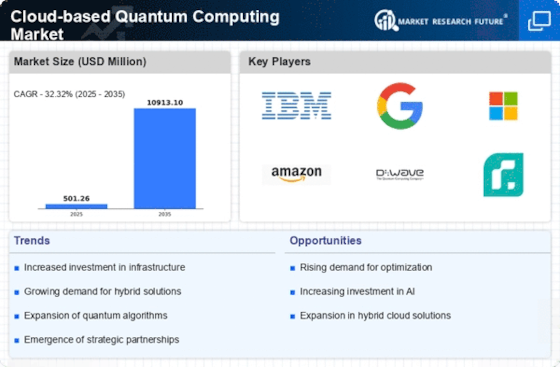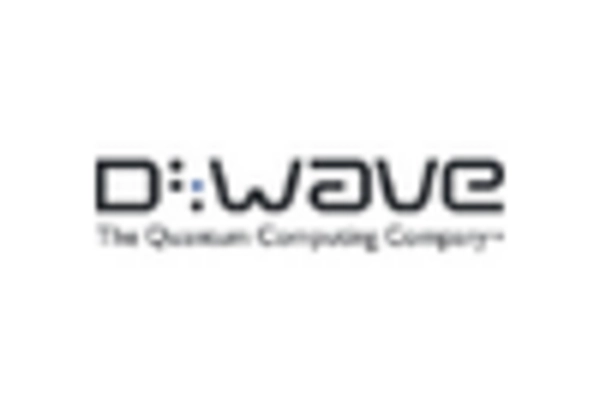-
EXECUTIVE SUMMARY
-
Market Attractiveness Analysis
- Global Cloud-based Quantum Computing Market, by Technology
- Global Cloud-based Quantum Computing Market, by Application
- Global Cloud-based Quantum Computing Market, by Region
-
MARKET INTRODUCTION
-
Definition
-
Scope of the Study
-
Market Structure
-
Key Buying Criteria
-
Macro Factor Indicator Analysis
-
RESEARCH METHODOLOGY
-
Research Process
-
Primary Research
-
Secondary Research
-
Market Size Estimation
-
Forecast Model
-
List of Assumptions
-
MARKET DYNAMICS
-
Introduction
-
Drivers
- Increasing demand for advanced computational capabilities.
- Growing investment in quantum technology research.
- Potential for quantum computing to revolutionize various industries.
- Drivers impact analysis
-
Restraints
- Technical challenges in scaling quantum systems.
- High upfront costs and limited accessibility.
- Restraint impact analysis
-
Opportunities
- Expanding applications in cryptography and optimization.
-
Challenges
- Achieving and maintaining quantum coherence.
-
Covid-19 Impact Analysis
- Impact on Cloud-based Quantum Computing Market
- Impact on End Users during the Lockdowns
-
MARKET FACTOR ANALYSIS
-
Value Chain Analysis/Supply Chain Analysis
-
Porter’s Five Forces Model
- Bargaining Power of Suppliers
- Bargaining Power of Buyers
- Threat of New Entrants
- Threat of Substitutes
- Intensity of Rivalry
-
GLOBAL CLOUD-BASED QUANTUM COMPUTING MARKET, BY TECHNOLOGY
-
Introduction
-
Superconducting Qubits
-
Trapped Ions
-
GLOBAL CLOUD-BASED QUANTUM COMPUTING MARKET, BY APPLICATION
-
Introduction
-
Encryption
-
Simulation and modelling
-
Optimization
-
Sampling
-
GLOBAL CLOUD-BASED QUANTUM COMPUTING MARKET SIZE ESTIMATION & FORECAST, BY REGION
-
Introduction
-
North America
- Market Estimates & Forecast, by Country, 2018-2032
- Market Estimates & Forecast, by Technology, 2018-2032
- Market Estimates & Forecast, by Application, 2018-2032
- US
- Canada
- Mexico
-
Europe
- Market Estimates & Forecast, by Country, 2018-2032
- Market Estimates & Forecast, by Technology, 2018-2032
- Market Estimates & Forecast, by Application, 2018-2032
- UK
- Germany
- France
- Italy
- Spain
- Rest of Europe
-
Asia-Pacific
- Market Estimates & Forecast, by Country, 2018-2032
- Market Estimates & Forecast, by Technology, 2018-2032
- Market Estimates & Forecast, by Application, 2018-2032
- China
- Japan
- India
- Australia
- South Korea
- Rest of Asia-Pacific
-
Rest of the World
- Market Estimates & Forecast, by Technology, 2018-2032
- Market Estimates & Forecast, by Application, 2018-2032
- MIDDLE EAST & AFRICA
- SOUTH AMERICA
- South America
-
COMPETITIVE LANDSCAPE
-
Introduction
-
Key Developments & Growth Strategies
-
Competitor Benchmarking
-
Vendor Share Analysis, 2022(% Share)
-
COMPANY PROFILES
-
IBM
- Company Overview
- Financial Overview
- Product Offered
- Key Developments
- SWOT Analysis
- Key Strategies
-
Microsoft
- Company Overview
- Financial Overview
- Product Offered
- Key Developments
- SWOT Analysis
- Key Strategies
-
Google
- Company Overview
- Financial Overview
- Product Offered
- Key Developments
- SWOT Analysis
- Key Strategies
-
AWS (Amazon Web Services)
- Company Overview
- Financial Overview
- Product Offered
- Key Developments
- SWOT Analysis
- Key Strategies
-
Baidu
- Company Overview
- Financial Overview
- Product Offered
- Key Developments
- SWOT Analysis
- Key Strategies
-
Rigetti Computing
- Company Overview
- Financial Overview
- Product Offered
- Key Developments
- SWOT Analysis
- Key Strategies
-
D-Wave Quantum Inc.
- Company Overview
- Financial Overview
- Product Offered
- Key Developments
- SWOT Analysis
- Key Strategies
-
T-Systems International GmbH
- Company Overview
- Financial Overview
- Product Offered
- Key Developments
- SWOT Analysis
- Key Strategies
-
Huawei Technologies Co.
- Company Overview
- Financial Overview
- Product Offered
- Key Developments
- SWOT Analysis
- Key Strategies
-
Accenture
- Company Overview
- Financial Overview
- Product Offered
- Key Developments
- SWOT Analysis
- Key Strategies
-
Cambridge Quantum Computing
- Company Overview
- Financial Overview
- Product Offered
- Key Developments
- SWOT Analysis
- Key Strategies
-
LIST OF TABLES
-
PRIMARY INTERVIEWS 19
-
LIST OF ASSUMPTIONS & LIMITATIONS 20
-
GLOBAL CLOUD-BASED QUANTUM COMPUTING MARKET, BY TECHNOLOGY, 2018–2032 (USD MILLION) 21
-
GLOBAL CLOUD-BASED QUANTUM COMPUTING MARKET, BY APPLICATION, 2018–2032 (USD MILLION) 22
-
GLOBAL CLOUD-BASED QUANTUM COMPUTING MARKET, BY REGION, 2018–2032 (USD MILLION) 24
-
NORTH AMERICA CLOUD-BASED QUANTUM COMPUTINGMARKET, BY COUNTRY, 2018–2032 (USD MILLION) 25
-
NORTH AMERICA CLOUD-BASED QUANTUM COMPUTINGMARKET, BY TECHNOLOGY, 2018–2032 (USD MILLION) 26
-
NORTH AMERICA CLOUD-BASED QUANTUM COMPUTINGMARKET, BY APPLICATION, 2018–2032 (USD MILLION) 27
-
US CLOUD-BASED QUANTUM COMPUTINGMARKET, BY TECHNOLOGY, 2018–2032 (USD MILLION) 29
-
US CLOUD-BASED QUANTUM COMPUTINGMARKET, BY APPLICATION, 2018–2032 (USD MILLION) 30
-
CANADA CLOUD-BASED QUANTUM COMPUTINGMARKET, BY TECHNOLOGY, 2018–2032 (USD MILLION) 32
-
CANADA CLOUD-BASED QUANTUM COMPUTINGMARKET, BY APPLICATION, 2018–2032 (USD MILLION) 33
-
MEXICO CLOUD-BASED QUANTUM COMPUTINGMARKET, BY TECHNOLOGY, 2018–2032 (USD MILLION) 35
-
MEXICO CLOUD-BASED QUANTUM COMPUTINGMARKET, BY APPLICATION, 2018–2032 (USD MILLION) 36
-
EUROPE CLOUD-BASED QUANTUM COMPUTINGMARKET, BY COUNTRY, 2018–2032 (USD MILLION) 38
-
EUROPE CLOUD-BASED QUANTUM COMPUTINGMARKET, BY TECHNOLOGY, 2018–2032 (USD MILLION) 39
-
EUROPE CLOUD-BASED QUANTUM COMPUTINGMARKET, BY APPLICATION, 2018–2032 (USD MILLION) 40
-
UK CLOUD-BASED QUANTUM COMPUTINGMARKET, BY TECHNOLOGY, 2018–2032 (USD MILLION) 42
-
UK CLOUD-BASED QUANTUM COMPUTINGMARKET, BY APPLICATION, 2018–2032 (USD MILLION) 43
-
GERMANY CLOUD-BASED QUANTUM COMPUTINGMARKET, BY TECHNOLOGY, 2018–2032 (USD MILLION) 45
-
GERMANY CLOUD-BASED QUANTUM COMPUTINGMARKET, BY APPLICATION, 2018–2032 (USD MILLION) 46
-
FRANCE CLOUD-BASED QUANTUM COMPUTINGMARKET, BY TECHNOLOGY, 2018–2032 (USD MILLION) 48
-
FRANCE CLOUD-BASED QUANTUM COMPUTINGMARKET, BY APPLICATION, 2018–2032 (USD MILLION) 49
-
SPAIN CLOUD-BASED QUANTUM COMPUTINGMARKET, BY TECHNOLOGY, 2018–2032 (USD MILLION) 51
-
SPAIN CLOUD-BASED QUANTUM COMPUTINGMARKET, BY APPLICATION, 2018–2032 (USD MILLION) 52
-
ITALY CLOUD-BASED QUANTUM COMPUTINGMARKET, BY TECHNOLOGY, 2018–2032 (USD MILLION) 54
-
ITALY CLOUD-BASED QUANTUM COMPUTINGMARKET, BY APPLICATION, 2018–2032 (USD MILLION) 55
-
REST OF EUROPE CLOUD-BASED QUANTUM COMPUTINGMARKET, BY TECHNOLOGY, 2018–2032 (USD MILLION) 57
-
REST OF EUROPE CLOUD-BASED QUANTUM COMPUTINGMARKET, BY APPLICATION, 2018–2032 (USD MILLION) 58
-
ASIA-PACIFIC CLOUD-BASED QUANTUM COMPUTINGMARKET, BY COUNTRY, 2018–2032 (USD MILLION) 60
-
ASIA-PACIFIC CLOUD-BASED QUANTUM COMPUTINGMARKET, BY TECHNOLOGY, 2018–2032 (USD MILLION) 61
-
ASIA-PACIFIC CLOUD-BASED QUANTUM COMPUTINGMARKET, BY APPLICATION, 2018–2032 (USD MILLION) 62
-
CHINA CLOUD-BASED QUANTUM COMPUTINGMARKET, BY TECHNOLOGY, 2018–2032 (USD MILLION) 64
-
CHINA CLOUD-BASED QUANTUM COMPUTINGMARKET, BY APPLICATION, 2018–2032 (USD MILLION) 65
-
JAPAN CLOUD-BASED QUANTUM COMPUTINGMARKET, BY TECHNOLOGY, 2018–2032 (USD MILLION) 67
-
JAPAN CLOUD-BASED QUANTUM COMPUTINGMARKET, BY APPLICATION, 2018–2032 (USD MILLION) 68
-
INDIA CLOUD-BASED QUANTUM COMPUTINGMARKET, BY TECHNOLOGY, 2018–2032 (USD MILLION) 70
-
INDIA CLOUD-BASED QUANTUM COMPUTINGMARKET, BY APPLICATION, 2018–2032 (USD MILLION) 71
-
SOUTH KOREA CLOUD-BASED QUANTUM COMPUTINGMARKET, BY TECHNOLOGY, 2018–2032 (USD MILLION) 73
-
SOUTH KOREA CLOUD-BASED QUANTUM COMPUTINGMARKET, BY APPLICATION, 2018–2032 (USD MILLION) 74
-
REST OF ASIA-PACIFIC CLOUD-BASED QUANTUM COMPUTINGMARKET, BY TECHNOLOGY, 2018–2032 (USD MILLION) 76
-
REST OF ASIA-PACIFIC CLOUD-BASED QUANTUM COMPUTINGMARKET, BY APPLICATION, 2018–2032 (USD MILLION) 77
-
REST OF WORLD CLOUD-BASED QUANTUM COMPUTINGMARKET, BY COUNTRY, 2018–2032 (USD MILLION) 79
-
REST OF WORLD CLOUD-BASED QUANTUM COMPUTINGMARKET, BY TECHNOLOGY, 2018–2032 (USD MILLION) 80
-
REST OF WORLD CLOUD-BASED QUANTUM COMPUTINGMARKET, BY APPLICATION, 2018–2032 (USD MILLION) 81
-
MIDDLE EAST & AFRICA CLOUD-BASED QUANTUM COMPUTINGMARKET, BY TECHNOLOGY, 2018–2032 (USD MILLION) 83
-
MIDDLE EAST & AFRICA CLOUD-BASED QUANTUM COMPUTINGMARKET, BY APPLICATION, 2018–2032 (USD MILLION) 84
-
SOUTH AMERICA CLOUD-BASED QUANTUM COMPUTINGMARKET, BY TECHNOLOGY, 2018–2032 (USD MILLION) 86
-
SOUTH AMERICA CLOUD-BASED QUANTUM COMPUTINGMARKET, BY APPLICATION, 2018–2032 (USD MILLION) 87
-
SOUTH AMERICA CLOUD-BASED QUANTUM COMPUTINGMARKET, BY TECHNOLOGY, 2018–2032 (USD MILLION) 89
-
SOUTH AMERICA CLOUD-BASED QUANTUM COMPUTINGMARKET, BY APPLICATION, 2018–2032 (USD MILLION) 90
-
BUSINESS EXPANSIONS/PRODUCT LAUNCHES 92
-
PARTNERSHIPS/AGREEMENTS/CONTRACTS/COLLABORATIONS 93
-
ACQUISITIONS/MERGERS 94
-
IBM : PRODUCTS OFFERED 95
-
IBM : KEY DEVELOPMENT 96
-
MICROSOFT : PRODUCTS OFFERED 97
-
MICROSOFT : KEY DEVELOPMENT 98
-
GOOGLE : PRODUCTS OFFERED 99
-
GOOGLE : KEY DEVELOPMENT 100
-
AWS : PRODUCTS OFFERED 101
-
AWS : KEY DEVELOPMENT 102
-
BAIDU : PRODUCTS OFFERED 103
-
BAIDU : KEY DEVELOPMENT 104
-
RIGETTI COMPUTING: PRODUCTS OFFERED 107
-
RIGETTI COMPUTING : KEY DEVELOPMENT 108
-
D-WAVE QUANTUM INC. : PRODUCTS OFFERED 111
-
D-WAVE QUANTUM INC. : KEY DEVELOPMENT 112
-
T-SYSTEMS INTERNATIONAL GMBH : PRODUCTS OFFERED 113
-
T-SYSTEMS INTERNATIONAL GMBH: KEY DEVELOPMENT 114
-
HUAWEI TECHNOLOGIES CO. : PRODUCTS OFFERED 115
-
HUAWEI TECHNOLOGIES CO. : KEY DEVELOPMENT 116
-
ACCENTURE : PRODUCTS OFFERED 117
-
ACCENTURE : KEY DEVELOPMENT 118
-
FUJITSU : PRODUCTS OFFERED 119
-
FUJITSU : KEY DEVELOPMENT 120
-
-
LIST OF FIGURES
-
MARKET SYNOPSIS 25
-
MARKET ATTRACTIVENESS ANALYSIS: GLOBAL CLOUD-BASED QUANTUM COMPUTING MARKET 26
-
GLOBAL CLOUD-BASED QUANTUM COMPUTING MARKET ANALYSIS, BY TECHNOLOGY 27
-
GLOBAL CLOUD-BASED QUANTUM COMPUTING MARKET ANALYSIS, BY APPLICATION 28
-
GLOBAL CLOUD-BASED QUANTUM COMPUTING MARKET ANALYSIS, BY DEPLOYMENT MODE 29
-
GLOBAL CLOUD-BASED QUANTUM COMPUTING MARKET ANALYSIS, BY REGION 30
-
GLOBAL CLOUD-BASED QUANTUM COMPUTING MARKET: STRUCTURE 31
-
RESEARCH PROCESS 32
-
TOP-DOWN AND BOTTOM-UP AND APPROACHES 33
-
NORTH AMERICA CLOUD-BASED QUANTUM COMPUTINGMARKET SIZE (USD MILLION) & MARKET SHARE (%), BY COUNTRY (2022 VS 2032) 34
-
EUROPE CLOUD-BASED QUANTUM COMPUTINGMARKET SIZE (USD MILLION) & MARKET SHARE (%), BY COUNTRY (2022 VS 2032) 35
-
ASIA PACIFIC CLOUD-BASED QUANTUM COMPUTINGMARKET SIZE (USD MILLION) & MARKET SHARE (%), BY COUNTRY (2022 VS 2032) 36
-
MIDDLE EAST & AFRICA CLOUD-BASED QUANTUM COMPUTINGMARKET SIZE (USD MILLION) & MARKET SHARE (%), BY COUNTRY (2022 VS 2032) 37
-
SOUTH AMERICA CLOUD-BASED QUANTUM COMPUTINGMARKET SIZE (USD MILLION) & MARKET SHARE (%), BY COUNTRY (2022 VS 2032) 38
-
SOUTH AMERICA CLOUD-BASED QUANTUM COMPUTINGMARKET SIZE (USD MILLION) & MARKET SHARE (%), BY COUNTRY (2022 VS 2032) 39
-
MARKET DYNAMICS ANALYSIS OF THE GLOBAL CLOUD-BASED QUANTUM COMPUTING MARKET 40
-
DRIVER IMPACT ANALYSIS 41
-
RESTRAINT IMPACT ANALYSIS 42
-
VALUE CHAIN: GLOBAL CLOUD-BASED QUANTUM COMPUTING MARKET 43
-
PORTER''S FIVE FORCES ANALYSIS OF THE GLOBAL CLOUD-BASED QUANTUM COMPUTING MARKET 44
-
GLOBAL CLOUD-BASED QUANTUM COMPUTING MARKET, BY TECHNOLOGY, 2022 (% SHARE) 45
-
GLOBAL CLOUD-BASED QUANTUM COMPUTING MARKET, BY TECHNOLOGY, 2022 VS 2032 (USD MILLION) 46
-
GLOBAL CLOUD-BASED QUANTUM COMPUTING MARKET, BY APPLICATION, 2022 (% SHARE) 47
-
GLOBAL CLOUD-BASED QUANTUM COMPUTING MARKET, BY APPLICATION, 2022 VS 2032 (USD MILLION) 48
-
GLOBAL CLOUD-BASED QUANTUM COMPUTING MARKET, BY REGION, 2022 (% SHARE) 51
-
GLOBAL CLOUD-BASED QUANTUM COMPUTING MARKET, BY REGION, 2022 VS 2032 (USD MILLION) 52
-
NORTH AMERICA CLOUD-BASED QUANTUM COMPUTINGMARKET, BY COUNTRY, 2022 (% SHARE) 53
-
NORTH AMERICA CLOUD-BASED QUANTUM COMPUTINGMARKET, BY COUNTRY, 2022 VS 2032 (USD MILLION) 54
-
NORTH AMERICA CLOUD-BASED QUANTUM COMPUTINGMARKET, BY TECHNOLOGY, 2022-2032 (USD MILLION) 55
-
NORTH AMERICA CLOUD-BASED QUANTUM COMPUTINGMARKET, BY APPLICATION, 2022-2032 (USD MILLION) 56
-
EUROPE CLOUD-BASED QUANTUM COMPUTINGMARKET, BY COUNTRY, 2022 (% SHARE) 58
-
EUROPE CLOUD-BASED QUANTUM COMPUTINGMARKET, BY COUNTRY, 2022 VS 2032 (USD MILLION) 59
-
EUROPE CLOUD-BASED QUANTUM COMPUTINGMARKET, BY TECHNOLOGY, 2022-2032 (USD MILLION) 60
-
EUROPE CLOUD-BASED QUANTUM COMPUTINGMARKET, BY APPLICATION, 2022-2032 (USD MILLION) 61
-
ASIA-PACIFIC CLOUD-BASED QUANTUM COMPUTINGMARKET, BY COUNTRY, 2022 (% SHARE) 63
-
ASIA-PACIFIC CLOUD-BASED QUANTUM COMPUTINGMARKET, BY COUNTRY, 2022 VS 2032 (USD MILLION) 64
-
ASIA-PACIFIC CLOUD-BASED QUANTUM COMPUTINGMARKET, BY TECHNOLOGY, 2022-2032 (USD MILLION) 65
-
ASIA-PACIFIC CLOUD-BASED QUANTUM COMPUTINGMARKET, BY APPLICATION, 2022-2032 (USD MILLION) 66
-
MIDDLE EAST & AFRICA CLOUD-BASED QUANTUM COMPUTINGMARKET, BY COUNTRY, 2022 (% SHARE) 68
-
MIDDLE EAST & AFRICA CLOUD-BASED QUANTUM COMPUTINGMARKET, BY COUNTRY, 2022 VS 2032 (USD MILLION) 69
-
MIDDLE EAST & AFRICA CLOUD-BASED QUANTUM COMPUTINGMARKET, BY TECHNOLOGY, 2022-2032 (USD MILLION) 70
-
MIDDLE EAST & AFRICA CLOUD-BASED QUANTUM COMPUTINGMARKET, BY APPLICATION, 2022-2032 (USD MILLION) 71
-
SOUTH AMERICA CLOUD-BASED QUANTUM COMPUTINGMARKET, BY COUNTRY, 2022 (% SHARE) 73
-
SOUTH AMERICA CLOUD-BASED QUANTUM COMPUTINGMARKET, BY COUNTRY, 2022 VS 2032 (USD MILLION) 74
-
SOUTH AMERICA CLOUD-BASED QUANTUM COMPUTINGMARKET, BY TECHNOLOGY, 2022-2032 (USD MILLION) 75
-
SOUTH AMERICA CLOUD-BASED QUANTUM COMPUTINGMARKET, BY APPLICATION, 2022-2032 (USD MILLION) 76
-
SOUTH AMERICA CLOUD-BASED QUANTUM COMPUTINGMARKET, BY COUNTRY, 2022 (% SHARE) 78
-
SOUTH AMERICA CLOUD-BASED QUANTUM COMPUTINGMARKET, BY COUNTRY, 2022 VS 2032 (USD MILLION) 79
-
SOUTH AMERICA CLOUD-BASED QUANTUM COMPUTINGMARKET, BY TECHNOLOGY, 2022-2032 (USD MILLION) 80
-
SOUTH AMERICA CLOUD-BASED QUANTUM COMPUTINGMARKET, BY APPLICATION, 2022-2032 (USD MILLION) 81
-
GLOBAL CLOUD-BASED QUANTUM COMPUTING MARKET: COMPETITIVE BENCHMARKING 83
-
VENDOR SHARE ANALYSIS (2022) (%) 84
-
IBM : FINANCIAL OVERVIEW SNAPSHOT 85
-
IBM : SWOT ANALYSIS 86
-
RIGETTI COMPUTING : FINANCIAL OVERVIEW SNAPSHOT 87
-
RIGETTI COMPUTING. : SWOT ANALYSIS 88
-
D-WAVE QUANTUM INC.: FINANCIAL OVERVIEW SNAPSHOT 89
-
GOOGLE : SWOT ANALYSIS 90
-
AWS: FINANCIAL OVERVIEW SNAPSHOT 91
-
D-WAVE QUANTUM INC.: SWOT ANALYSIS 92
-
T-SYSTEMS INTERNATIONAL GMBH : FINANCIAL OVERVIEW SNAPSHOT 93
-
T-SYSTEMS INTERNATIONAL GMBH: SWOT ANALYSIS 94
-
HUAWEI TECHNOLOGIES CO. : FINANCIAL OVERVIEW SNAPSHOT 97
-
ACCENTURE: SWOT ANALYSIS 98
-
ACCENTURE : FINANCIAL OVERVIEW SNAPSHOT 101
-
CAMBRIDGE QUANTUM COMPUTING: FINANCIAL OVERVIEW SNAPSHOT 103
-
CAMBRIDGE QUANTUM COMPUTING : SWOT ANALYSIS 104
-
FUJITSU: FINANCIAL OVERVIEW SNAPSHOT 105
-
FUJITSU: SWOT ANALYSIS 106
-
1QBIT : FINANCIAL OVERVIEW SNAPSHOT 107
-
1QBIT : SWOT ANALYSIS 108
-
RIVERLANE : FINANCIAL OVERVIEW SNAPSHOT 109
-
RIVERLANE : SWOT ANALYSIS 110
-
NOTE:
-
This table of content is tentative and subject to change as the research progresses.
-
In section 11, only the top 10 companies will be profiled. Each company will be profiled based on the Market Overview, Financials, Service Portfolio, Business Strategies, and Recent Developments parameters.
-
The companies are selected based on two broad criteria¬– strength of product portfolio and excellence in business strategies.
-
Key parameters considered for evaluating strength of the vendor’s product portfolio are industry experience, product capabilities/features, innovations/R&D investment, flexibility to customize the product, ability to integrate with other systems, pre- and post-sale services, and customer ratings/feedback.
-
Key parameters considered for evaluating a vendor’s excellence in business strategy are its market share, global presence, customer base, partner ecosystem (technology alliances/resellers/distributors), acquisitions, and marketing strategies/investments.
-
The financial details of the company cannot be provided if the information is not available in the public domain and or from reliable sources.


















Leave a Comment